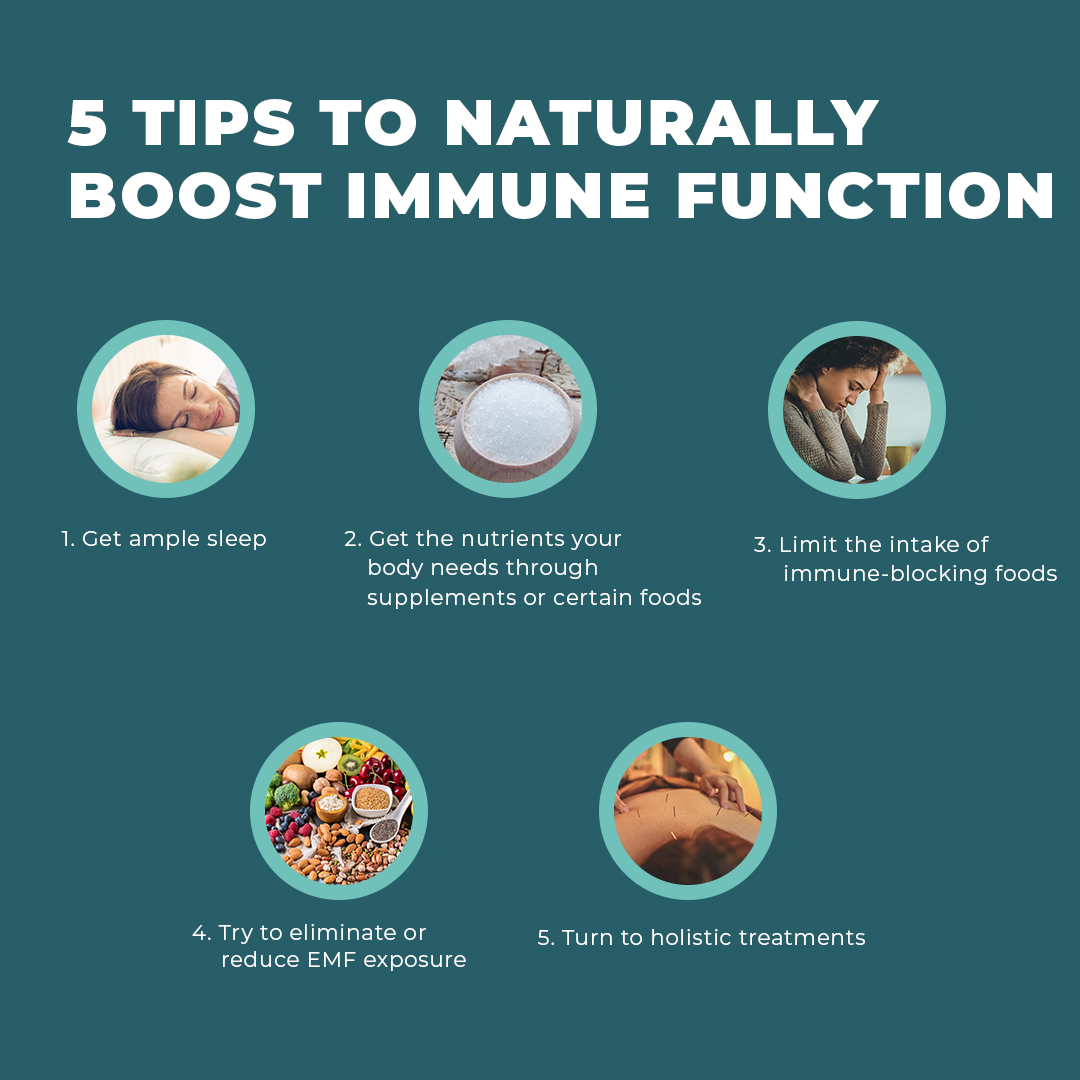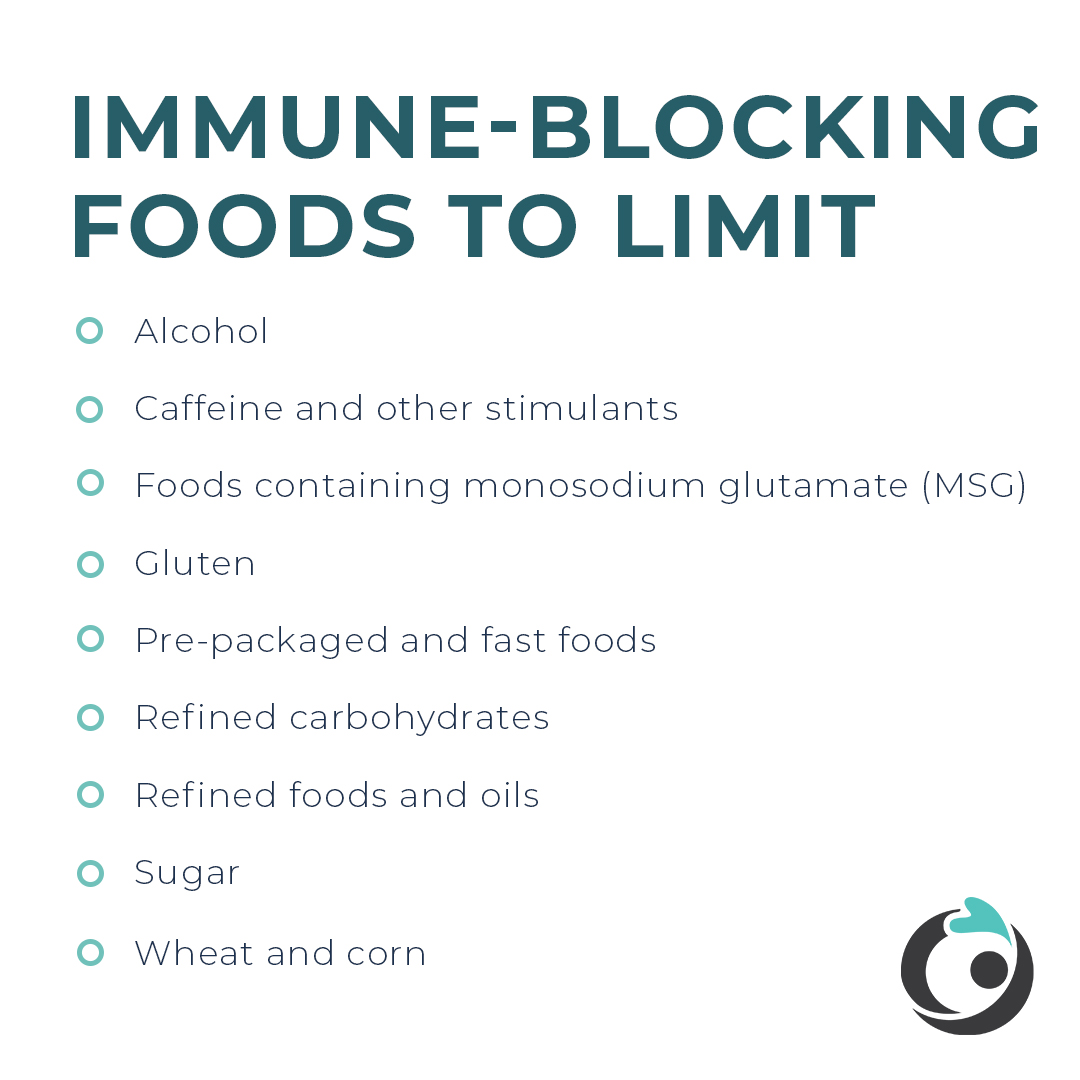Whether you’re exposed to the flu, a severe cold, or something else, you need a strong immune system to stay well. Bacteria, viruses, and other pathogens come knocking on the door of our immune defense system daily. Healthy and vigorous immune function ensures that those potential invaders don’t cause chaos throughout your body.
When a viral or bacterial threat arises, one of the most significant concerns is underlying health conditions, including poor immune function. People with “weak” immune systems tend to get sick more often than those with healthy immune systems. Supporting a strong immune system and taking sensible precautions is the key to combatting any viral or bacterial onslaught.
The body’s immune system combats foreign invaders attempting to enter the body every second of every day. Much of the immune system resides in the gut, specifically the microbiome. These gut bacteria detect invaders and signal the rest of the body’s immune defenses to kill the pathogens. So how can you boost immune function naturally? (1, 2, 3)

1. Get Ample Sleep
Sleep is a critical modulator of the immune response. It’s a highly effective antiviral and anti-pathogenic tool. Without enough sleep, the body will not produce enough antibodies to fight foreign pathogens in the body. So make sure to get eight to nine hours of sleep per night.
Take steps to improve your sleep naturally. Say no to other areas of your life that interfere with adequate sleep, particularly when the body faces a pathogenic threat. Prioritize your health. You need sleep for immunity, proper liver function, and more. (4, 5, 6, 7, 8)
Also of note: When the body faces viral or bacterial threats, the mitochondria — the small structures within cells that produce energy — switch from their primary energy-producing role to an immune defense role. That’s why it’s typical for people to feel fatigued when infections challenge them. While mitochondria support immune defenses, they produce less energy. (1, 9, 10, 11)
2. Get the Nutrients Your Body Needs Through Supplements or Certain Foods
Nutrition and supplementation are closely linked to immune health. The body needs healthy foods, minerals, nutrients, and related substances to promote overall wellness. When your body is functioning at its best, your immune system will be too. And beyond that, many foods and supplements have been shown to have a direct positive influence on immune function. Here’s a look at some of the substances that are known immune boosters. (11, 1, 12, 13)
CBD
CBD is a cannabinoid compound derived from hemp or cannabis. It does not affect the mind like another well-known cannabinoid — its cousin, THC. Cannabinoids modulate white blood cells that clear out toxins, viruses, and other pathogens. (10, 14, 15)
Along with boosting immunity, CBD is an effective anti-inflammatory and pain reliever. But be mindful of the purity and potency of any CBD product you purchase. Many companies have released inferior products just to jump on the CBD bandwagon. (16, 10)
Cistus incanus tea
Cistus incanus has potent antiviral properties, even against viruses that cause life-threatening diseases. It fights influenza virus activity, reduces the symptoms of the common cold and upper respiratory infections, and inhibits HIV infections, Ebola, and Marburg virus. (17, 18, 12)
Cistus incanus also has antibacterial and antifungal properties and destroys biofilms. Biofilms are like a slime layer that protects bacteria against antimicrobials, human immune defenses, medications, and other substances that would be dangerous to them. That makes it easier for them to survive and form infections in the body. Research suggests that 65% to 80% of human infections are caused by biofilms. (19, 20, 21, 12)
Interestingly, recent studies suggest that Cistus extract can prevent viruses from attaching to and entering cells, as well as reducing their reproductive ability and virulence. (12)
Colloidal silver
Colloidal silver is a suspension of microscopic silver particles in a liquid. Since ancient times in Egypt, Greece, Macedonia, Phoenicia, and Rome, people have used silver medicinally to keep immune function strong. These civilizations knew that silver possesses potent antimicrobial effects. Medical texts written by Hippocrates, the “father of medicine,” state that silver has beneficial healing and anti-disease properties. He also praised silver for its wound-healing and tissue-repair abilities. Silver was one of the few antimicrobial treatments available before antibiotic drugs were developed. (22)
Studies show that silver nanoparticles are effective antimicrobials and are active against many drug-resistant bacteria when coupled with antibiotics. You can take colloidal silver as a dietary supplement or apply it directly to the skin. You can also use it in a nebulizer, which allows breathing of the cold steam into the lungs and sinuses. (13)
Essential oils
Many essential oils used in aromatherapy have antimicrobial properties. Some essential oils also have antiviral activity: (23, 24, 14)
- Boswellia
- Copaiba
- Frankincense
- WO China healing oil
In particular, frankincense oil is a traditional medicine derived from the boswellia plant. It produces anti-anxiety, anti-inflammatory, anti-neurotic, antiseptic, and expectorant effects. (14)
Selenium
Selenium helps support the immune response and prevent viral replication. Some forms of supplemental selenium are much more readily absorbed and used by the body, and are therefore more beneficial than others. Aim for about 200 micrograms (mcg) per day from selenium that your body can easily metabolize. (25, 26, 27)
Vitamin C
Vitamin C affects several components of the immune system. It stimulates the production and function of your immune defense’s white blood cells. Vitamin C also has antioxidant functions that can protect the white blood cells from this damage as they do their job. (28, 29, 30, 15)
In this way, vitamin C can act as the commander of your immune army. Many varieties of vitamin C are available on the market, so it may be wise to rotate the different types. Liposomal vitamin C comes in capsule and liquid forms. Botanical sources include amla (amalaki powder), camu camu, and dried rosebuds. Dried rosebuds supply a natural form of alkaline vitamin C.
IV vitamin C can also help fight pathogens. It can support the immune system by clearing the terrain and getting rid of current infections that are occupying the immune bandwidth. (31)
Vitamin D
Vitamin D helps to boost the immune system and fights back against various forms of bacteria, fungi, and viruses that might exist in the body. Plus, vitamin D can regulate both innate and adaptive immune responses. (32, 33)
Unfortunately, most of the American population is vitamin-D deficient. Aim for about 10,000 IU (international units) daily of vitamin D. Sources include: (34)
- Dehydrated liver and whole-food liver supplements
- Mushrooms (which contain beta-glucans)
- Pure cod liver oil
- Sun exposure
- Wild-caught fatty fish
Viruses and other pathogens can easily enter an unhealthy cell with poor cell membrane integrity. The good fats found in wild-caught fish and other animal proteins strengthen the cell membranes. Robust cell membranes are critical to good health. (35, 36, 37)
Zinc
Zinc is an essential micronutrient, and it manages many different physiological functions.
Research has also found that it plays a critical role in viral infections. People with zinc deficiency are more prone to these infections. In addition, zinc inhibits viral replication and supports other immune system functions. (38, 16)
You can increase your zinc levels through foods or supplements. A wide variety of foods contain zinc, particularly: (16, 39, 40)
- Dark chocolate
- Legumes, including beans, chickpeas, and lentils
- Nuts, like cashews
- Organic, grass-fed, and pasture-raised dairy products
- Organic, grass-fed, and pasture-raised eggs
- Organic, grass-fed, and pasture-raised meats
- Seeds, particularly hemp, pumpkin, sesame, and squash seeds
- Some vegetables, including potatoes and sweet potatoes
- Whole grains
- Wild-caught shellfish, especially oysters
If you opt for supplements, zinc glycinate and zinc gluconate are both easily absorbed forms. But remember that more is not necessarily better, as too much supplemental zinc may weaken your immune system. Take about 20 to 50 milligrams (mg) per day to boost immune function and fight infection. (41, 42)
Other potentially helpful foods and supplements
Best foods for the immune system include fermented foods like kefir, kimchi, miso, pickles, and sauerkraut by providing the gut with bacteria that enhance immune function. (43)
The following also support an antiviral and antimicrobial protocol: (44, 45, 46, 47)
- Bitter melon
- Black cumin seed oil
- Chinese skullcap
- Coconut oil and coconuts
- Curcumin
- Elderberry
- Green tea
- Lomatium root (Lomatium dissectum)
- Luteolin
- Lysine
- Manuka honey
- Pantethine (vitamin B5)
- Reishi mushroom
- St. John’s wort (Hypericum perforatum)
- Stevia (whole plant)
- Stinging nettle (Urtica dioica)
3. Limit the Intake of Immune-Blocking Foods
Some things that you might eat and drink can actually sabotage your immune system. Try to limit the worst food ingredients for the immune system or avoid those types of foods and drinks and maintain a healthy diet. (17, 48)
For example, eating foods that are high in sugar and trans-fats but low in complex carbohydrates, dietary fiber, micronutrients, and omega-3 fatty acids can cause a range of metabolic and systemic disorders. This can include cardiovascular disease, diabetes, liver disease, obesity, and stroke. They also cause chronic inflammation that hinders immune function. (11)
Although lean protein is good for the body, a diet that is rich in fatty proteins, such as cheese and processed meats, has been shown to increase inflammation in the intestine. (49, 1)
In addition, in a study, mice injected with the flu virus and then fed a high-fat diet showed a higher viral load in their heart and lungs, with corresponding inflammation and damage. Their immune systems were less equipped to fight off the virus. Even after receiving a flu vaccine, the mice didn’t react as efficiently to the antibodies, and the vaccine was less effective. (1)
Also, foods that are high in processed carbohydrates, including those with white flour and/or refined sugar, can overwork the mitochondria and increase production of harmful free radicals in the body. After even one sugary meal, the immune system can kick into overdrive, sending out cytokines and other proteins that cause inflammation and end up harming, rather than protecting, the body. (1)
Consuming the following can suppress or interfere with proper immune function: (50, 51, 52, 53, 54, 17, 55, 56)
- Alcohol
- Caffeine and other stimulants (which boost cortisol, a hormone that can lower immune function)
- Foods containing monosodium glutamate (MSG)
- Gluten
- Pre-packaged and fast foods
- Refined carbohydrates
- Refined foods and oils
- Sugar (suppresses the immune system for up to six hours after ingestion)
- Wheat and corn (due to fungi, mold, pesticide residues, and their resultant decrease in immune function)

4. Try to Eliminate or Reduce EMF Exposure
Electromagnetic fields (EMFs) and electromagnetic radiation (EMR) reduce immunity. They are everywhere in our environment, from Wi-Fi to “smart” devices, and they can affect your body’s own electromagnetic field. EMFs emit a positive charge and supply positive ions to the human electromagnetic field. This positive charge creates a perfect storm for negatively charged viruses to replicate. Studies show that EMFs also compromise the immune system. (57, 58)
Even low levels of radiation can lead to immunity impairments, as well as Alzheimer’s disease, dementia, and heart disease. To eliminate or reduce EMFs: (59, 60, 61)
- Avoid carrying your cell phone on your person
- Avoid using portable computers and tablets on your lap
- Do not charge the phone near your body, especially your head
- Minimize cell phone use or place it in airplane mode more often
- Put EMF protection stickers on your electronic devices
- Reduce or prevent use of wireless devices by children, because they are particularly vulnerable to electromagnetic frequencies
- Reduce your use of wireless devices by hardwiring when possible
- Remove the Bluetooth headset from your ear
- Sleep in a shielded room
- Turn off Wi-Fi at night
Grounding the body and creating a negative charge can boost immunity. The body’s systems will work correctly and you’ll be better protected against viruses and other pathogens when your body carries a negative charge. Whenever possible, increase exposure to negative ions and reduce exposure to positive ions.
5. Turn to Holistic Treatments
When in doubt, turn to your favorite go-to holistic method to boost immunity, feel good, and support your overall health.
Clean away pathogens naturally
Keep your environment clean and pathogen-free by using chemical-free cleansers and essential oils to get rid of some of the microbial invaders that might challenge your immune system. Wash your hands regularly by using natural sanitizers that are alcohol-based or made of colloidal silver or essential oils. (62)
Keeping your environment clean is only part of the battle, however. Your inner terrain determines how susceptible you will be to everyday pathogens and toxins. Detox often to remove potential obstacles that can interfere with your immune system and body's natural cleansing abilities. Also, look for ways to support the fundamentals of a healthy body functioning at its full capacity: drainage and mitochondrial energy production.
Get relief with acupuncture
Acupuncture is believed to have a significant effect on the immune system. For starters, research shows that acupuncture can stimulate the body’s natural killer (NK) cells. These are the cells in the immune system that attack and kill cells that have been altered or damaged by disease or pathogens. For this reason, NK cells can help the immune system stop tumor growth and fight cancer and other diseases. (3)
Acupuncture may also help activate T cells and B cells, which are the two types of lymphocytes in the immune system. B cells make antibodies to ward off cell invaders, such as bacteria, toxic substances, and viruses. T cells, much like NK cells, attack and eliminate cells in the body that have already been contaminated by such trespassers. They do this before the damaged cells can proliferate and take over healthy cells. (3)
Heat up at an infrared sauna
Infrared saunas stimulate heat shock proteins (HSPs) that are essential for the immune system. This creates a “faux fever” that helps eliminate infections. Research has found that HSPs help the immune system identify substances that stimulate antibody production (antigens). HSPs also help activate lymphocytes and macrophages, two types of white blood cell immune defenders. (63, 64, 65)
Steam sauna's can also be beneficial. Along with strengthening your immune system, steam sauna's also improve blood pressure, heart function, lung capacity, skin health, and sleep.
Spend some time in nature
Studies have shown that exposure to the great outdoors, especially among trees or other plants, is a good way to improve immune function. When we hang out in nature, we are bathed in phytonicides, which are the plants’ equivalent of our protective white blood cells. They help plants fight off insects and disease the way that our white blood cells ward off pathogens and illnesses. (4)
Nature also has a variety of beneficial effects on us, from mood enhancement to weight loss, to keep us happier and healthier in general.
Stretch and destress with yoga
Stress has a negative effect on immune health. Research suggests that the immune system is in constant communication with the central nervous system, which includes the brain and spinal cord. Your neurotransmitters “speak” to your immune cells. This is why your emotions can have such a powerful effect on your immune function. (2)
Yoga is an excellent way to relieve stress due to its relaxing effects, which means that practicing yoga can also help support the immune system. In a study conducted on students feeling stressed about an upcoming exam, students who performed yoga showed less stress hormone (cortisol) and improved cytokine levels in their blood, and therefore better corresponding immune function than the control group. (66, 2)
Another study showed that yoga supports the immune system by decreasing inflammation, fighting disease, improving immune response, and overall keeping the body more in balance. (2)
Use Practical Yet Effective Solutions
Applying the advice included here can help your immune system function at its maximum level. You can make many lifestyle choices to help fight viruses and microbial invaders naturally. If your immune defenses weaken, it’s best to start rebuilding your protection as soon as possible.
For instance, you can address your nutrition, physical activity, and sleep habits when you first start feeling ill. Consume more foods that will strengthen your immune response and avoid those that will weaken it.
Besides modifying your diet, consider your sleeping habits. Are you getting enough restorative sleep at night? Plus, keep in mind that regular physical activity helps boost immune function. But find the right balance. Overdoing exercise can add unwanted stress to the body, while the right amount of physical activity can protect you from disease.
Emotional stressors can also challenge your immune system. Stress leaves you more susceptible to infection. Managing your daily stress, especially during trying and uncertain times, can help protect your body from potential invaders.
If you want to stay healthy, don’t underestimate the power of the immune system to protect and heal you. But for your immune system to do its work, you need to do what you can to support it. Together, you can work toward optimal health.


